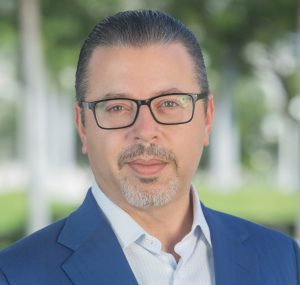By: Max Crampton-Thomas

2 min read May 2020 — Wealth management services have undergone significant transformation over the last two decades, as the financial landscape grows in sophistication. Joseph Fernandez, regional president of BNY Mellon Wealth Management, shares his insights on what makes a financial firm successful in catering to today’s needs and into the future.
What significant milestones did BNY Mellon achieve in the Miami market over the last year?
We have been operating in the Miami market for 23 years. We came to this market by acquisition. BNY Mellon acquired an investment advisory firm in 1997 with the belief that being in South Florida, and Miami particularly, was extraordinarily important to the continued growth of the business. The firm was a smaller multimillion-dollar operation and had limited offerings for clients. We now have a midsize office in the overall Florida market with over half of our staff based in Miami and a robust wealth management offering. BNY Mellon Wealth Management’s total assets exceeded several billion dollars in the Florida market.
Thinking about how migration has worked for a long time in this county is paramount. On the one hand, as clients migrated from the North toward the warmer climates of the South, it made sense to follow them and provide support in those areas, doing it in a way where we truly internalized the “biggest small town” personality of Miami. You needed people who knew the community well. On the other hand, you also have south to north migration, from Latin America to South Florida, which has evolved over decades. Seventy percent of Miami-Dade County’s population is Latin-American, and more than half is foreign-born (2010 US Census). The company had the vision to see the confluence of these factors as an enormous growth driver.
How have you seen clients’ needs shift in recent years?
Wealth in the United States has continued to grow. The composition of wealth changes as wealth transfers from one generation to another. The preferences of the wealthy change, often as a result of that transition. The need for digital tools and capabilities to interact across platforms with wealthy clients and their families, conferring digital interaction options between clients and the firms that serve them has truly taken off. The adoption curve is at its highest point. In 1995, the complexity of the financial services business was rather straightforward, with a U.S.-centric portfolio. Over the last several years, multijurisdictional families have become more prevalent. The preference for investment beyond just the United States and having representation and portfolios of more diverse geographic holdings has also increased dramatically. The other evolution is a shift from the traditional asset-side focus—cash, stocks, bonds—to the liability-side of the equation and managing the tax implications of it all to the level of sophistication that a wealthy client requires from their advisory firm.
There is an upward trend in recent decades of people building up and selling businesses, as private equity has been active in taking out businesses and creating consolidation. The latter, in turn, created several former business owners and CEOs with significant levels of wealth and a serial entrepreneur profile to a point where you become the client’s CFO and chief investment officer because that is the level of sophistication they require for their personal wealth. Our active wealth process boils down to five practices: invest, borrow, spend, manage, protect.
How has your company continued to oversee its regional business throughout the COVID-19 outbreak?
It is a tribute to preparation, infrastructure and adaptability that I believe is the hallmark of our business and organization. We leverage technology, working in a cloud-based environment that enables us to deploy a quick home-office capacity. We are providing resources to our employees, whether technology or health and wellness-related, eliminating insurance co-payments relative to COVID-19 treatments and holding daily check-ins with our teams.
What notable developments in the market are you keeping a close eye on?
The obvious one iterating over the last 24 months was the introduction of the Tax Cuts and Jobs Act, which created a limitation on state and local income tax deductions. We have seen that translate into a North-to-South migratory pattern that has been accelerating quite dramatically to the benefit of Miami-Dade County, as we have no state income tax, relatively low business burdens, more affordable costs of living and a favorable climate. The collateral implication of this has been a couple of things. One is that for many years the narrative around the technology space here was well ahead of the reality. Now the latter has caught up with the former. Our colleges and universities have done a spectacular job in preparing the workforce for those types of jobs. Financial services firms are also multiplying due to the available talent.
To learn more about our interviewee, visit:
